 | |
Brunei | Myanmar |
|---|---|
Brunei and Myanmar established diplomatic relations in 1993. Brunei has an embassy in Yangon, and Myanmar has an embassy in Gadong. [1] Both countries share friendly bilateral co-operation in education, health and labour. [2]
 | |
Brunei | Myanmar |
|---|---|
Brunei and Myanmar established diplomatic relations in 1993. Brunei has an embassy in Yangon, and Myanmar has an embassy in Gadong. [1] Both countries share friendly bilateral co-operation in education, health and labour. [2]
Relations between the two countries has been established since 21 September 1993. [1] The relations are friendly and both countries are working on the health and education sectors as well to establish a bilateral trade and signed a double taxation avoidance agreement. [3] In 1998, Brunei Sultan Hassanal Bolkiah has paid a visit to Myanmar. Since that, the ministries and personnel from both nations have maintained a long-term relationship and exchanges. Many Burmese academicians, intellectuals and intelligentsia, medics, nurses and workers also contributed to the development of Brunei. [4] Brunei also support Myanmar for the ASEAN chairmanship in 2015 by training Burmese officials for the role. [5]
In economic relations, the Brunei National Petroleum Company (BNP) is one of the firms qualified to embark on the exploration of oil and gas onshore at a block in Myanmar. [5] Both countries also focused on health education and technical assistance as well co-operating in capacity building and human resource development. [6] [7]
Brunei joined ASEAN on 7 January 1984, one week after resuming full independence, and gives its ASEAN membership the highest priority in its foreign relations. Brunei joined the United Nations in September 1984. It is also a member of the Organisation of Islamic Cooperation (OIC), the Asia-Pacific Economic Cooperation (APEC) forum and the Commonwealth of Nations. Brunei hosted the APEC Economic Leaders' Meeting in November 2000. In 2005 it attended the inaugural East Asia Summit.

India, officially the Republic of India, has full diplomatic relations with 201 states, including Palestine, the Holy See, and Niue. The Ministry of External Affairs (MEA) is the government agency responsible for the conduct of foreign relations of India. With the world's third largest military expenditure, second largest armed force, fifth largest economy by GDP nominal rates and third largest economy in terms of purchasing power parity, India is a prominent regional power and a rising superpower.
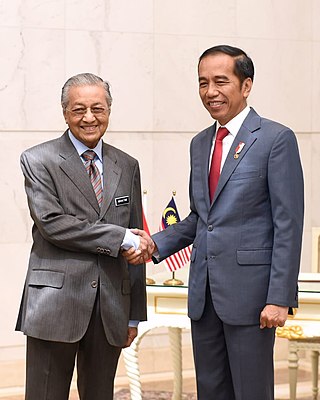
Since independence, Indonesian foreign relations have adhered to a "free and active" foreign policy, seeking to play a role in regional affairs commensurate with its size and location but avoiding involvement in conflicts among major powers. During the presidency of Sukarno, Indonesia's foreign relations were marked by engagement with other newly independent nations in Asia and Africa, as exemplified by the Bandung Conference, the subsequent foundation of the Non-Aligned Movement and a confrontational attitude towards Western powers, justified by a belief in the CONEFO and opposition to what Sukarno termed as NEKOLIM.

Malaysia is an active member of various international organisations, including the Commonwealth of Nations, the United Nations, the Organisation of Islamic Cooperation, and the Non-Aligned Movement. It has also in recent times been an active proponent of regional co-operation.

Historically strained, Myanmar's foreign relations, particularly with Western nations, have improved since 2012. Relations became strained once more in 2017 with the Rohingya crisis. Myanmar has generally maintained warmer relations with near states and is a member of the Association of Southeast Asian Nations.
The foreign relations of Thailand are handled by the Ministry of Foreign Affairs of Thailand.

As of April 2022, Vietnam maintains diplomatic relationships with 189 UN member states, State of Palestine and Sahrawi Arab Democratic Republic. In 2011 the Central Committee of the Communist Party of Vietnam, at the 11th National Congress of the Communist Party of Vietnam, released an official statement about Vietnam's foreign policy and a section of the statement stated: "Vietnam is a friend and reliable partner of all countries in the international community, actively taking part in international and regional cooperation processes. Deepen, stabilize and sustain established international relations. Develop relations with countries and territories in the world, as well as international organizations, while showing: respect for each other's independence; sovereignty and territorial integrity; non-interference in each other's international affairs; non-use or threat of force; settlement of disagreements and disputes by means of peaceful negotiations; mutual respect, equality and mutual benefit."

The Maldives has remained an independent nation throughout its recorded history, save for a brief spell of Portuguese occupation in the mid-16th century. From 1887 to 1965, the country was a British protectorate while retaining full internal sovereignty. At its independence in 1965, the Maldives joined the United Nations on 20 September.

India–Thailand relations, also called Indian-Thai relations or Indo-Thai relations, are the bilateral relations between India and Thailand. Relations were established in 1947, soon after India gained independence. Priests have provided a cultural link between the two countries since 1500 BCE. India shares a long sea border with Thailand as India's Andaman and Nicobar Islands share a maritime border with Thailand along the Andaman Sea. Since 2001, both countries have witnessed growing warmth, increasing economic and commercial links, exchange of high-level visits, and the signing of various agreements leading to a further intensification of relations. Thailand and India are cooperating in various multilateral fora like India's dialogue partnership with ASEAN, the ASEAN Regional Forum (ARF), and the East Asia Summit, the sub-regional grouping BIMSTEC involving Bangladesh, India, Sri Lanka, Thailand, Myanmar, Nepal and Bhutan, and trilateral transport linkages with Thailand, Myanmar and India. India is a member of the Asia Cooperation Dialogue (ACD) initiated by Thailand in 2002 and of the Mekong–Ganga Cooperation (MGC), a group of six countries.

The Foreign Ministry is the government body in the Sultanate of Oman responsible for organising and directing Oman's relations with other countries and with regional and international organisations.
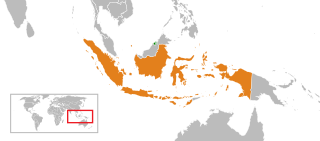
Brunei Darussalam and Indonesia established diplomatic relations in 1984. Since then, both country enjoys warm and friendly relations. Brunei has an embassy in Jakarta, while Indonesia has an embassy in Bandar Seri Begawan. Indonesia and Brunei don't share direct land borders. Since diplomatic relations were established back in 1984, Overall relations between the two countries were progressing well and that both sides continued to enjoy strong ties in a wide spectrum of co-operations; including trade and investment, tourism, agriculture, marine and fisheries, health, defence, transnational crimes, education, youth, culture and people-to-people contacts.

Brunei and Cambodia established diplomatic relations in 1992. Brunei has an embassy in Phnom Penh, and Cambodia has an embassy in Bandar Seri Begawan. Both countries co-operate in trade, education and defence.

Brunei and Laos established diplomatic relations in 1993. Brunei has an embassy in Vientiane, and Laos has an embassy in Bandar Seri Begawan. Both countries co-operate in trade, education and defence.
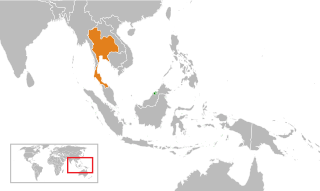
Brunei and Thailand have bilateral foreign relations. Brunei has an embassy in Bangkok, and Thailand has an embassy in Bandar Seri Begawan. The relations have always been close and cordial.

Brunei and Vietnam established diplomatic relations in 1992. Brunei has an embassy in Hanoi, and Vietnam has an embassy in Bandar Seri Begawan. Relations between the two countries have always been friendly especially in political field.

Brunei and South Korea established diplomatic relations in 1984. Brunei has an embassy in Seoul, and South Korea has an embassy in Bandar Seri Begawan.

Brunei–Japan relations refers to bilateral foreign relations between Brunei and Japan. Brunei has an embassy in Tokyo, and Japan has an embassy in Bandar Seri Begawan.
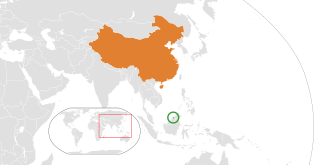
Brunei and China established formal diplomatic relations in 1991. Brunei has an embassy in Beijing, and China has an embassy in Bandar Seri Begawan.

Brunei and Qatar established diplomatic relations in 1991. Brunei has an embassy in Doha, and Qatar has an embassy in Bandar Seri Begawan.
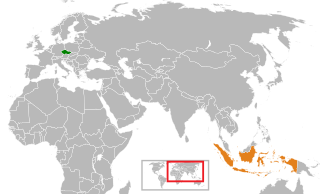
The Czech Republic and the Republic of Indonesia established diplomatic relations in 1950. Both nations have agreed to forge ties to deepen relations, especially in the business and trade sector. Indonesia has an embassy in Prague, while the Czech Republic has an embassy in Jakarta that is also accredited to Brunei, Timor Leste, Singapore and ASEAN, and honorary consulates in Bali, Makassar and Surabaya.